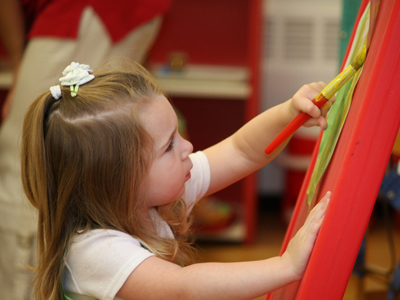About the Preschool and Kindergarten Program (2 to 6 years old)
"Any child who is self-sufficient, who can tie his shoes, dress or undress himself, reflects in his joy and sense of achievement the image of human dignity, which is derived from a sense of independence. We must support as much as possible the child's desires for activity; not wait on him, but educate him to be independent. "
Maria Montessori
While in the Preschool program, your young child, from the age of two to five years old, the Kindergarten year, will begin the "approach to learning program." The Preschool classroom is adapted to the developmental needs of each child, providing a variety of choices that engage the child’s natural curiosity and intellect. Activities emphasize the process of discovery, enabling each child to explore the world through multi-sensory materials. The Preschool and Kindergarten Curriculum includes the following areas:
- Practical Life focuses on daily living activities that help develop a sense of accomplishment and self-esteem.
- Sensorial materials encourage children to use their five senses to develop classification and discrimination skills.
- Science & Geography create opportunities to explore and develop concrete foundations for understanding the world.
- Mathematics provides a hands-on approach to number concepts, quantity and operations.
- Language is designed to give children a firm grounding in perceptual-motor, pre-reading, and pre-writing readiness skills. Your child will progress through various stages to the ultimate goal of establishing the skills necessary for success in reading and writing.
- Art & Music develop the child’s creativity and sense of beauty through expressive use of materials and activities.
Classroom & Materials
 A key principal of the Preschool Program is
the multi-age classroom. We know that children progress at different
rates in different areas. Providing a two to five year span of
materials and activities allows each child to work at the pace and
level best suited for their individual interests and abilities and lets
each child find peers with whom the child can share his or her
interests. The younger children have role models in the older children,
and the older children acquire additional confidence by being the
classroom elders.“Teaching” or caring for a younger child
is an excellent way to consolidate one’s own learning. The
Kindergarten children take great pride in being the leaders of the
classroom!
A key principal of the Preschool Program is
the multi-age classroom. We know that children progress at different
rates in different areas. Providing a two to five year span of
materials and activities allows each child to work at the pace and
level best suited for their individual interests and abilities and lets
each child find peers with whom the child can share his or her
interests. The younger children have role models in the older children,
and the older children acquire additional confidence by being the
classroom elders.“Teaching” or caring for a younger child
is an excellent way to consolidate one’s own learning. The
Kindergarten children take great pride in being the leaders of the
classroom!
Materials used in the Preschool program bring abstract principles to life. There are objects to sort and sequence, beads to add or subtract, letters to touch and trace, and real dishes to wash. The children engage in meaningful activities not just pretend ones. They practice tying their own shoes and hanging their own coats. They peel, chop, and serve bananas or apples instead of “playing” with plastic imitations. Good manners and social interactions are very much a part of each activity because the Montessori Preschool classroom is a mini-society that belongs to the children.
Curriculum
Practical Life
These activities help children learn about daily living, such as
pouring, cleaning, food preparation, buttoning, zipping and grace and
courtesy. Children engage in activities by utilizing real materials!
They wash real dishes with real water, soap bubbles and real mess!
They chop carrots and core apples all while developing true self-esteem
and confidence as these activities promote independence and purpose. A
child may paint a picture at the easel or create the weekly art project
at the art station.
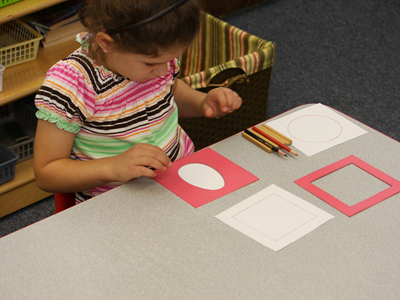 Sensorial
Sensorial
Young children learn by exploring their world through their senses. Sensorial materials contain experiences with textures, colors, sizes and shapes. Children can play with blocks that teach biggest to smallest or longest to shortest. They can sort sound cylinders or make geometrical shapes with the triangle boxes to name only a few.
Language Arts
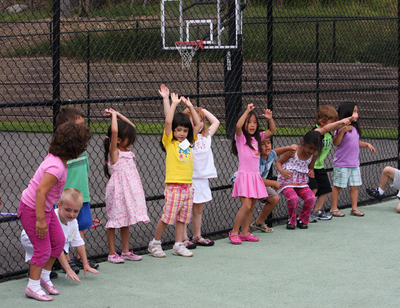 A Montessori classroom
includes many sensory materials that allow young children to learn
their letters by sight, feel, and texture. As young as age four a child
might use the “Moveable Alphabet” to begin sounding out and
spelling simple words. Our Pre-K and older children begin more formal
instruction in reading during the reading group period.
A Montessori classroom
includes many sensory materials that allow young children to learn
their letters by sight, feel, and texture. As young as age four a child
might use the “Moveable Alphabet” to begin sounding out and
spelling simple words. Our Pre-K and older children begin more formal
instruction in reading during the reading group period.
Here lessons are taught, stories are read, and handwriting is practiced. We use all the Montessori materials combined with a highly recognized reading program unique only to Apple Montessori. We have found, over many years, that our students typically begin reading simple words before they enter Kindergarten. By the Kindergarten year they are reading short books and loving reading!
The success of this approach has been validated by standardized test results. For more than 25 years 90% of our students have scored above the 90 percentile rank!
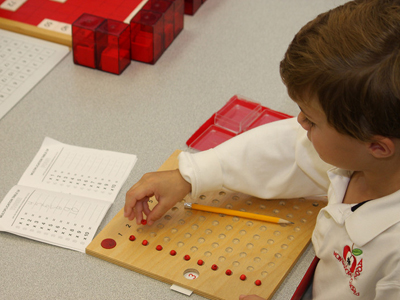 Mathematics
Mathematics
There is no classroom on earth as well-endowed with math materials as an Apple Montessori classroom! Golden Beads, Fraction Insets, the Stamp Game, the Dot Game, Cubing Materials, Long and Short Chains, Measurement of Area materials, and the Racks and Tubes for long division are just a few of the many, many materials that facilitate a strong understanding of numerical concepts and operations. The materials are presented sequentially, when an individual child is ready to understand the concepts, and allow each child to move through the curriculum at his or her own pace.
Gradually, because of the firm foundation that the hands-on materials provide, each child moves closer and closer to the time when they can leave the materials behind and perform mathematical functions abstractly.
Science
Our science curriculum begins in the preschool years with simple
activities involving plants, animals, the solar system, and the weather.
The basic tenet behind our approach to the sciences is to present the
children with real examples before enlarging on concepts and facts. In
zoology, for example, the children study the classification of living
organisms. It may begin with a living fish swimming in a tank. After
watching the animal for several days the children are presented with a
lesson on the parts of a fish. Later the process is duplicated with
tadpoles or a guinea pig. Each new group serves as an example of how
living organisms moved out of the primordial sea to live on the land
and then adapted to the environmental changes that have occurred over
the ages.
In Botany, the children may go outdoors to collect real plants which they will examine as they label the parts of the plant. Seeds are planted and nurtured so that children can see how they germinate and turn their leaves towards the sun and their roots towards underground water sources.
History of the Universe begins with the “Big Bang,” represented by a balloon filled with confetti that explodes over the classroom. The children create clay models of the solar system, go outside to draw a HUGE scale model of planetary orbits on the sports court, and practice rotating and revolving around a friend. This study is supported by continuing research and current events activities that give the children a broad understanding of our continuing quest for an understanding of where did we come from? How did we get here? Is there other life in the universe? Apple's youngest students enjoy discovering what sinks or floats in a large bowl of water. Or digging in sand to find dinosaur bones!
History and Geography
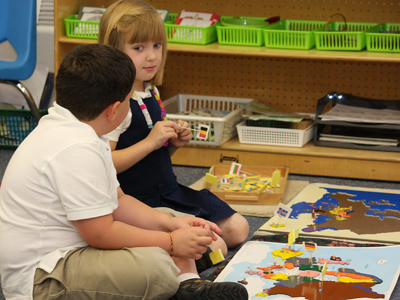 The traditional
Montessori approach to history is atypical in that it is very much
incorporated into the evolutionary study of science. We have modified
this traditional approach to extend the children’s knowledge of
political history as well. An appreciation of cultural similarities and
differences is fundamental.
The traditional
Montessori approach to history is atypical in that it is very much
incorporated into the evolutionary study of science. We have modified
this traditional approach to extend the children’s knowledge of
political history as well. An appreciation of cultural similarities and
differences is fundamental.
In the preschool years the children work with small globes and then puzzle maps to become familiar with the names and locations of the world’s continents, oceans, and countries. Stories from other lands are read. Songs from around the world are sung. Major holidays such as Columbus Day, Martin Luther King Jr. Day, and Presidents’ Day are celebrated. Our Kindergarten children work on special group projects to learn about the world and the people who inhabit it. They participate in International Week which is loved by both children and parents.
Art
We enrich the lives of our students each day by exposing them to the fundamentals of art. We use an array of tools, techniques and mediums to develop creativity while instilling lifelong skills which promote overall personal success. The daily art curriculum cultivates the children's imaginations and creativity as they paint at the easel and construct the weeks art project. In addition to these daily activities we have integrated an Art Enrichment program into our monthly curriculum. Look for our Art Enrichment displays when you come to visit our school! They are incredible!
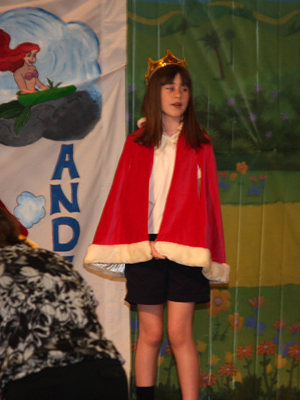 Music
and Drama
Music
and Drama
Nurturing an appreciation for music and the arts is an integral part of our daily curriculum. We introduce the children to an array of songs, finger plays and nursery rhymes. Our formal Music Enrichment classes include lessons in voice, rhythm, musical notes and moving to music. The children enjoy the many opportunities they have to present live performances to their parents including musical plays and skits.
Foreign Language
Apple's first grade Spanish Enrichment curriculum has been modified and is now being introduced into the pre-school and Kindergarten classes. The children are introduced to the experience of learning a second language while developing their vocabulary through hands on activities, games and songs! "Aprendiendo un Segundo idioma es facil para una mente joven" (learning a second language is easy for the young mind).
Character and Ethics Development
Our program at Apple is designed to educate the whole child. Having a strong character along with a quality education is the key to success in the lives of our children. Our pre-school and Kindergarten students are encouraged to develop their character while cultivating ethical and responsible behavior. We accomplish this each day in our classrooms as we introduce the children to a set of shared values and ideals. Some of these values include grace and courtesy and well as respect and kindness for others.
Along with daily instruction our students are introduced to our innovative Character Development Program. Using puppets, games and theme based lesson plans; we give your child the knowledge necessary to develop principled social skills. Your child will learn about cooperation in our "join in and play'" class or flexibility and perseverance in our "Try and Stick with it Class." These and many other lessons are presented with in our Character Enrichment Program.
Technology
 Every classroom is equipped with at least
one, and sometimes two, computers. It is our belief that the computer
should be treated as an integral tool for learning.
Every classroom is equipped with at least
one, and sometimes two, computers. It is our belief that the computer
should be treated as an integral tool for learning.
In the preschool years each computer has educational games and children
are encouraged to learn computer techniques by using the computers
regularly. In the elementary years, we teach computer skills in
context. The children use the educational software that is provided but
also use the computers to research information and to publish finished
projects.
IApple also offers a technology based program called Fastrackids! This unique cutting-edge program allows children to work on a Smart Board as they develop basic knowledge, critical thinking skills and public speaking skills! See programs for more information and visit a location to see it in action!
Physical Education
During the preschool years, the children have several periods a day of outdoor play in our well-equipped playgrounds and sport courts. When the weather is poor we provide time for movement activities indoors in our spacious classrooms and in our gymnasiums.(see individual facilities) Here the children develop large and fine motor skills, participate in fitness and movement activities, and practice specific skills such as throwing or dribbling a ball. The emphasis is on movement education, spatial awareness, and balance through cooperative games, rhythm, gymnastics, and physical fitness.
Throughout the Montessori curriculum, movement is paramount. Much
time is spent teaching the children to move gracefully, to develop and
use large and fine motor skills, and  to
learn to control their own movements so as not to disrupt or disturb
other students. Children move around the classroom all day long. On a
larger scale this fundamental principle of Montessori education teaches
the child to respect other people and to self-monitor how his or her
own actions impact others who share the classroom. We believe that
through freedom of movement a child acquires true discipline.
to
learn to control their own movements so as not to disrupt or disturb
other students. Children move around the classroom all day long. On a
larger scale this fundamental principle of Montessori education teaches
the child to respect other people and to self-monitor how his or her
own actions impact others who share the classroom. We believe that
through freedom of movement a child acquires true discipline.

Schedule
The Preschool program is offered as either a half day or a full day program. A half day session will be from 8:30 a.m. to 11:30 a.m. or from 12:30 p.m. to 3:30 p.m... The full day program runs from 8:30 a.m. to 3:30 p.m. The children play outside (weather permitting) in the morning, after lunch, and again in the afternoon. Kindergarten aged children stay indoors in the morning for reading group rather than play outside. Younger children nap after lunch instead of going outside but are in the playground later in the afternoon. Full day children may bring a lunch from home or you may choose to purchase a hot meal from the independent catering company that provides this service to our students. Daycare hours are 7 a.m. to 6 p.m.

